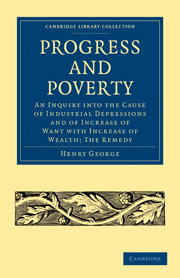 Progress and Poverty
Progress and Poverty Book contents
- Frontmatter
- PREFACE TO FOURTH EDITION
- Contents
- INTRODUCTORY
- BOOK I WAGES AND CAPITAL
- Chapter I The current doctrine—its insufficiency
- Chapter II The meaning of the terms
- Chapter III Wages not drawn from capital, but produced by the labor
- Chapter IV The maintenance of laborers not drawn from capital
- Chapter V The real functions of capital
- BOOK II POPULATION AND SUBSISTENCE
- BOOK III THE LAWS OF DISTRIBUTION
- BOOK IV EFFECT OF MATERIAL PROGRESS UPON THE DISTRIBUTION OF WEALTH
- BOOK V THE PROBLEM SOLVED
- BOOK VI THE REMEDY
- BOOK VII JUSTICE OF THE REMEDY
- BOOK VIII APPLICATION OF THE REMEDY
- BOOK IX EFFECTS OF THE REMEDY
- BOOK X THE LAW OF HUMAN PROGRESS
- CONCLUSION
- INDEX
Chapter I - The current doctrine—its insufficiency
Published online by Cambridge University Press: 07 September 2011
- Frontmatter
- PREFACE TO FOURTH EDITION
- Contents
- INTRODUCTORY
- BOOK I WAGES AND CAPITAL
- Chapter I The current doctrine—its insufficiency
- Chapter II The meaning of the terms
- Chapter III Wages not drawn from capital, but produced by the labor
- Chapter IV The maintenance of laborers not drawn from capital
- Chapter V The real functions of capital
- BOOK II POPULATION AND SUBSISTENCE
- BOOK III THE LAWS OF DISTRIBUTION
- BOOK IV EFFECT OF MATERIAL PROGRESS UPON THE DISTRIBUTION OF WEALTH
- BOOK V THE PROBLEM SOLVED
- BOOK VI THE REMEDY
- BOOK VII JUSTICE OF THE REMEDY
- BOOK VIII APPLICATION OF THE REMEDY
- BOOK IX EFFECTS OF THE REMEDY
- BOOK X THE LAW OF HUMAN PROGRESS
- CONCLUSION
- INDEX
Summary
Reducing to its most compact form the problem we have set out to investigate, let us examine, step by step, the explanation which political economy, as now accepted by the best authority, gives of it.
The cause which produces poverty in the midst of advancing wealth is evidently the cause which exhibits itself in the tendency, everywhere recognized, of wages to a minimum. Let us, therefore, put our inquiry into this compact form:
Why, in spite of increase in productive power, do wages tend to a minimum which will give but a bare living?
The answer of the current political economy is, that wages are fixed by the ratio between the number of laborers and the amount of capital devoted to the employment of labor, and constantly tend to the lowest amount on which laborers will consent to live and reproduce, because the increase in the number of laborers tends naturally to follow and overtake any increase in capital. The increase of the divisor being thus held in check only by the possibilities of the quotient, the dividend may be increased to infinity without greater result.
In current thought this doctrine holds all but undisputed sway. It bears the indorsement of the very highest names among the cultivators of political economy, and though there have been attacks upon it, they are generally more formal than real. It is assumed by Bucklo as the basis of his generalizations of universal history.
- Type
- Chapter
- Information
- Progress and PovertyAn Inquiry into the Cause of Industrial Depressions and of Increase of Want with Increase of Wealth; The Remedy, pp. 15 - 26Publisher: Cambridge University PressPrint publication year: 2009First published in: 1881


